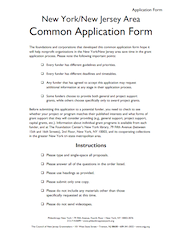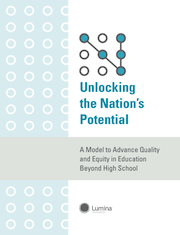Site Search
- resource provided by the Forum Network Knowledgebase.
Search Tip: Search with " " to find exact matches.
Two different CNJG members queried the CEO listserve on how/when/how to return to the office following the COVID-19 pandemic. CNJG staff compiled the answers from the responding members removing identifying information of the respondents.
The rising cost of housing, a limitation on supply of affordable housing stock, and economic shocks and disruptions have led to an increase in homelessness across the United States. Over this time period, the City of Newark has made strides in fostering collaborative and innovative approaches to housing the unhoused. In December, the City released a strategic plan to end chronic homelessness, the first plan of its kind in some time. Specifically, its vision states that “Newark will strive to end chronic homelessness for all individuals over the next three years through collaboration, prevention, and housing.” The vision goes on to state that when it [homelessness] cannot be prevented, it will be a rare, brief, and nonrecurring experience.”
We hope that you will join us as we hear from leaders of this collaborative effort as they discuss how they are working toward their shared vision.
Panelists:
Luis Ulerio, Newark Homelessness Czar, Director of the Mayor’s Office of Homeless Services
Jim Pelliccio, Chair of the City of Newark Commission on the Homeless and President and CEO of Port Newark
Evan Weiss, President and CEO, Newark Alliance
Cost: Free for CNJG Members; $50 for Non Member Grantmakers.

More than a decade ago, the Council of New Jersey Grantmakers and Philanthropy New York spearheaded a project to develop common application and report forms to help streamline the grant application process and ease the often time-consuming grant preparation process.
This application is a four-page form, which includes directions for use, a sample cover sheet, and the common grant proposal guidelines.
The separate Common Report Form follows closely the format of the New York/New Jersey Area Common Application Form.
Information for Grantmakers:
One of the core values at the Trust-Based Philanthropy Project (with whom CNJG partnered on a trust-based grantmaking learning series in the summer of 2021 – read about Part 1, Part 2, and Part 3) encourages funders to streamline their requirements for paperwork from nonprofits. Accepting the NY/NJ Area Common Grant Report Form is one way. Another is to accept reports from nonprofits that they submitted to a different funder.
Recent articles from Vu Le at NonprofitAF.com (We need to have a serious talk about character limits on grant applications and Trust-based grantmaking: What it is and why it’s critical to our sector), Joan Garry in the Chronicle of Philanthropy (A Plea from Community Nonprofits for Investment Equity and less Bureaucracy), and the research project by the Technology Association of Grantmakers (Grant Applications Share 39% Similarity According to New Research by TAG) in the summer of 2021 have re-focused attention on the concept of a common grant application.
CNJG encourages our members to review the application and report form, and consider accepting these forms (or using these questions on your online application / report form) from your current or potential grantees.
CNJG surveyed our members in August 2021 asking if they accepted the NY/NJ Area Common Grant Application and report form. CNJG members can download that report (link forthcoming).
Information for Grantseekers:
Before sending this (or any) application to any funder, be sure to check their specific funding guidelines and application requirements. Some funders require preliminary, additional, or supplementary information. Some funders only accept their own application form. CNJG members are under no obligation to accept either the common grant application or common grant report form.
Additional notes when using the NY/NJ Area Common Grant Application Form:
- Please check with each individual funder if they accept only their own form, the NY/NJ Area Common Grant Application form, or some other form.
- Funding area guidelines still apply. Research each organization’s funding areas to be sure your proposal fits within their guidelines before submitting your application.
- Any funder that has agreed to accept the NY/NJ Area Common Grant Application may request additional information at any stage in their application process.
- Every funder has different deadlines and timetables. Refer to each organization's funding and/or reporting guidelines.
- Do not submit the NY/NJ Area Common Grant Application or report form to the Council of New Jersey Grantmakers. Submit your application directly to the organization from which you are requesting support.
- Questions should be directed to the organization from which you are requesting support.

This case study of the Council of Michigan Foundations' Peer Action Learning Network (PALN) is one of six examined in a report from New York University's Wagner Research Center for Leadership in Action, commissioned by Grantmakers for Effective Organizations. The PALN case study, along with the other five, explores the power of learning communities to build connections and knowledge to increase organizations’ community impact. It explains ways grantmakers can strategically support these efforts as well as key elements for designing learning communities, executing for success and extending the learning.
Rising Tide Capital (RTC), a prominent New Jersey-based entrepreneurship training organization, has received a transformative three-year, $1.5 million grant from the Geraldine R. Dodge Foundation to catalyze the nonprofit’s programmatic expansion in Trenton and throughout New Jersey. This award, approved by the Foundation’s Board of Trustees, will provide $500,000 annually to advance RTC’s impactful entrepreneurship education and workforce development initiatives catering to historically marginalized communities.
The Dodge Foundation’s strategic investment will bolster entrepreneurship education centered on high-opportunity licensed, credentialed, and certified career pathways. It will also provide comprehensive one-on-one technical assistance, resilience coaching, and tailored business support to entrepreneurs. Furthermore, the grant will fund strategic innovation projects that integrate RTC’s established programs with statewide partners, thereby significantly expanding the reach and accessibility of services to underserved communities throughout New Jersey.
Summer always brings to mind those great “summer reads.” This has been an “occasional series” of CNJG eNews during the summer, over the years. In addition to this year’s curated list – I’m thrilled to share recommendations from a few CNJG Board members and the CNJG team!
CNJG Board of Trustees’ Secretary, Maisha Simmons, Robert Wood Johnson Foundation, recommends Heather McGhee’s The Sum of Us: What Racism Costs Everyone and How we can Prosper Together. There’s also a podcast series, and the book has been adapted for young readers.
The Work: My Search for a Life that Matters by Wes Moore is the top pick from Board member, Jasmyne Beckford, The Prudential Foundation. Jasmyne reflects, this book helped her think about how she can live a life that creates impact for generations both personally and professionally.
CNJG Board member Justin Kiczek, F. M. Kirby Foundation, recently read Getting Beyond Better: How Social Entrepreneurship Works. “As our foundation holds both stewardship and entrepreneurship as core values, it helps me understand how social entrepreneurs start their journey and scale their solutions.”
In honor of Black Philanthropy Month this August, I’m excited to feature a few great reads created to inspire and inform your philanthropic journey. Thank you to Manager of Communications Shakirat Odunsi for curating this list:
- Madam C. J. Walker's Gospel of Giving: Black Women's Philanthropy during Jim Crow highlights Walker’s visionary approach to philanthropy and community-building, emphasizing the vital role of Black women’s giving in advancing social justice. Freeman’s work sheds light on how Walker’s philanthropy was an extension of her entrepreneurial spirit and commitment to racial and gender equality.
- Ford Foundation’s Darren Walker reimagines Andrew Carnegie’s vision of philanthropy for the modern era in From Generosity to Justice: A New Gospel of Wealth, urging philanthropists to go beyond charity and address systemic inequalities to foster justice and lasting change.
- Emergent Strategy: Shaping Change, Changing Worlds encourages readers to embrace adaptability and resilience by using emergent strategies – small-scale actions that create large-scale impact. Author adrienne maree brown challenges traditional models of organizing and invites us to envision a more just and equitable world through collaboration, creativity, and deep connections with others. It’s a guidebook for those seeking to shape the future and navigate the complexities of change.
- Isabel Wilkerson explores how entrenched hierarchies based on race and class impact every aspect of our lives in Caste: The Origins of Our Discontents. Through compelling narratives and meticulous research, she reveals how this hidden system continues to perpetuate inequality and injustice, challenging us to confront these deeply rooted structures and work toward true equality.
From the CNJG team, Director of Member Services Craig Weinrich is currently reading How We Give Now: A Philanthropic Guide for the Rest of Us by Lucy Bernholz. This book demonstrates that philanthropy is about much more than money. Bernholz posits that even giving our data willingly to companies is an act of philanthropy. This is a great intersection to the Spring Colloquium conversation around AI, and ongoing discussions about how we can expand our definition of philanthropy as guided by our Strategic Plan.
Chanika Svetvilas, Manager of Programs and Learning recommends Against Technoableism by Ashley Shew and Imagination A Manifesto by Ruha Benjamin. Not too long ago I read Four Thousand Weeks: Time Management for Mortals, which prompted me to really consider what each of us should focus on in our day-to-day work, and what we need to let go. It’s a practical, insightful guide that led to several “aha” moments. All three books challenge us to think very differently about our world and what’s possible.
And finally, a recently discovered read I’ve gifted to family and friends, All the Colors of Life by renowned artist Lisa Aisato; this will lift your spirits as you find yourself paging through it and experiencing it over and over again.

Happy Summer Reading!
On a different note, I hope you will join us at the Summer Joint Policy Forum – Nonprofit and Philanthropic Champions for New Jersey on August 13, at The Heldrich in New Brunswick. I look forward to seeing you there, and hearing what’s on your summer reading list!
Sincerely,
Theresa Jacks, President and CEO
Council of New Jersey Grantmakers
This report highlights three philanthropic efforts to build the capacity of local communities in the West - The Ford Family Foundation’s Ford Institute Leadership Program, the Northwest Area Foundation’s Horizons Program, and the Orton Family Foundation’s Heart and Soul Community Planning Program.
A key objective of the Scaling What Works initiative has been to translate insight and learning from grantmaker intermediaries involved with the Social Innovation Fund and share them with the broader philanthropic community. The fifth guide in the Lessons Learned series presents the benefits and challenges of partnerships between local and national funders, and highlights key considerations for both kinds of funders to foster success in their collaboration.
